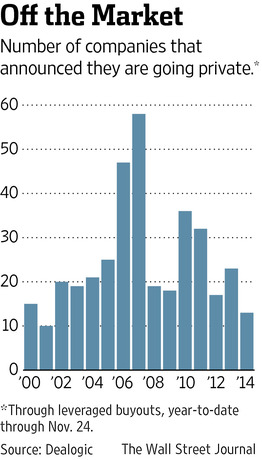|
THE WALL STREET JOURNAL.
CFO
Journal.
December 2, 2014, 3:02 AM
ET
Pricey Stocks Curb LBO Hunger
By John Kester
Reporter
Record
stock prices have curbed the number of companies that leveraged-buyout
firms want to take private. Just 13 firms have announced they would go
private so far this year. That is the fewest since 2001, when just 10
public companies announced, according to data provider Dealogic.
With
stock prices up, “bargains are more difficult to find,” said Richard
Peterson, an analyst at S&P Capital IQ. Take-private LBOs totaled
$11.6 billion, down 83% from 2013’s year-to-date total of $68.9
billion.
Instead,
private-equity firms are increasingly buying specialized divisions
rather than their larger parent companies, Mr. Peterson said. Carlyle
Investment Management LLC announced it would buy Johnson
& Johnson‘s ortho-clinical diagnostics division for $4.15 billion
in January.
Low
interest rates and high stock prices, Mr. Peterson said, mean
investors are “waiting for the pullback that, you know, never happens
until something cataclysmic happens and then everything gets swept
down.”
Some
companies are willing to sell only low-performing divisions, he said,
mentioning Procter
& Gamble Co.’s agreement last month to sell Duracell to Berkshire
Hathaway for $4.7 billion. A Procter & Gamble spokesman countered
that the deal shows a “vote of confidence” in Duracell.
Tibco Software Inc.
was the largest company to announce its public departure this year, at
$4.3 billion. Telecommunications-equipment company Riverbed
Technology Inc. and software firm Compuware Corp. will
do the same in deals valued at $3.4 billion and $2.4 billion,
respectively.
But those
deals are dwarfed by last year’s largest. H.J. Heinz Co. went private
in a $27.5 billion leveraged buyout, and Dell went off the market for
$24.4 billion.
|
